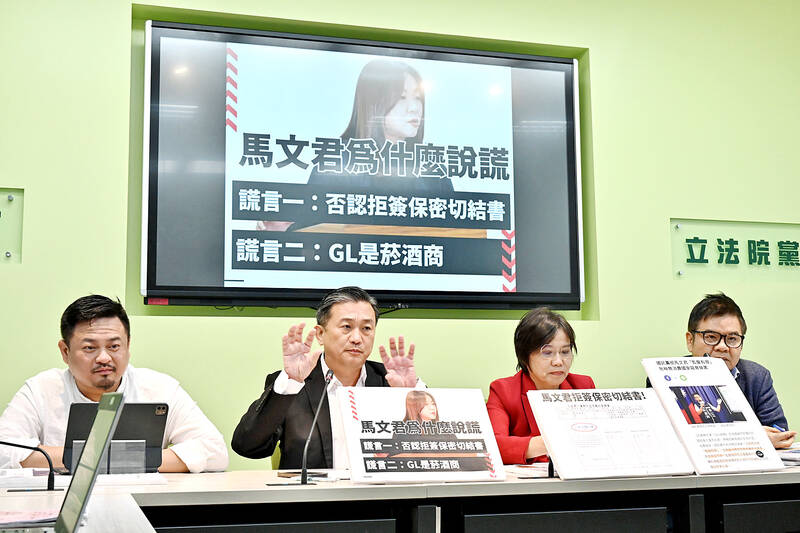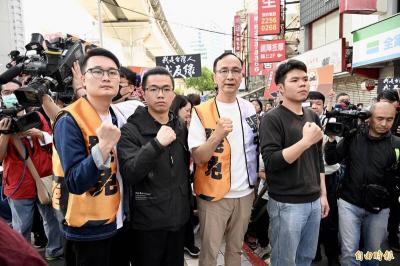Democratic Progressive Party lawmakers yesterday claimed that Chinese Nationalist Party (KMT) Legislator Ma Wen-chun (馬文君) had refused to sign a confidentiality agreement on the Indigenous Defense Submarine program and also contravened regulations by talking on her mobile phone when reviewing classified material in closed-door legislative meetings.
Ma has been accused of passing more than 3,000 confidential files and voice recordings on the program to South Korean officials last year, with whistle-blowers alleging that Ma and her aides represented other foreign contractors seeking to muscle in on the project and therefore wanted to block design and construction work by South Korean and European companies.
At a Foreign Affairs and National Defense Committee meeting in March 2019, at which Ministry of National Defense officials presented materials on details of the submarine design, construction plans and budget items, 13 of the committee’s 14 lawmakers signed a confidentiality agreement, except Ma, DPP Legislator Wang Ting-yu (王定宇) said.

Photo: George Tsorng, Taipei Times
“Even when a legislative staffer took it to Ma asking her to sign, she refused to do so,” he said, adding that records from that meeting included a handwritten note saying: “Committee member Ma Wen-chun refused to sign” the confidentiality agreement.
During the seven years from commencing the program and reviewing the design blueprints in 2017 to completing the first submarine, the Hai Kun (海鯤號) last month, ministry officials had conferred with committee members at three important closed-door meetings, where the legislators were asked to sign a confidentiality agreement, Wang said.
Wang said the first meeting was on March 28, 2019, for ministry officials to report on the construction phase of the program, the second on Oct. 16, 2020, to review the budget and a third on Dec. 22, 2021, for a final review and a ministry progress report.
The committee’s regulations state that legislators can peruse confidential material, but should not make notes or take photographs, that legislative staffers should sweep the committee room to guard against the planting of bugs, and that all materials should be returned at end of each session, he said.
“All these are done to keep these materials confidential. It is quite despicable when a legislator leaks these national secrets,” Wang said.
At one of these meetings, Ma was seen talking on a Personal Handy-phone System handset, as Internet-connected smartphones were withheld, he said, adding that a rear admiral asked Ma not to do so, while both DPP and KMT legislators castigated Ma for breaking the regulations and told her to stop using the phone.
Ma used the phone to provide her top aide with information from classified materials on the submarine program, and she made notes about the material and left the committee room several times, DPP Legislator Chuang Jui-hsiung (莊瑞雄) said.
“Ma’s actions had two main motives; the first was money, as she was representing other contractors looking to take part in the project; the second was to leak the core technology and the contractors undertaking the work, to interfere and stop the submarine program from being completed,” Chuang said. “It is against Taiwan’s national interest and a betrayal of our nation, but sadly the KMT is still fully supporting her, telling people she has done nothing wrong.”
Separately, New Power Party Legislator Chiu Hsien-chih (邱顯智) called on Ma to apologize for “leaking state secrets” to foreign officials and urged the KMT to remove her from the Foreign Affairs and National Defense Committee and replace her with another legislator.
In response, Ma posted a public message on social media saying: “The so-called confidentiality agreement is just a useless piece of paper. You can sign it, or not sign it, but either way it does not affect a legislator’s rights and responsibilities when attending a closed-door meeting involving classified materials.”
She also denied the accusations made against her, while demanding that the legislature and the ministry investigate who had leaked files and documents pertaining to the submarine program that have now been made public in the media.

The Ministry of Economic Affairs has fined Taobao NT$1.2 million (US$36,900) for advertisements that exceeded its approved business scope and ordered the Chinese e-commerce platform to make corrections in the first half of this year or its license would be revoked. Lawmakers have called for stricter supervision of Chinese e-commerce platforms and more stringent measures to prevent China from laundering its goods through Taiwan as US President Donald Trump’s administration cracks down on origin laundering. The legislature’s Finance Committee yesterday met to discuss policies to prevent China from dumping goods in Taiwan, inviting government agencies to report on the matter. Democratic Progressive Party

Taiwan and its Pacific ally Tuvalu on Tuesday signed two accords aimed at facilitating bilateral cooperation on labor affairs, according to Taiwan’s Ministry of Foreign Affairs (MOFA). The governments inked two agreements in Taipei, witnessed by Foreign Minister Lin Chia-lung (林佳龍) and visiting Deputy Tuvaluan Prime Minister Panapasi Nelesone, MOFA said in a news release. According to MOFA, the agreements will facilitate cooperation on labor issues and allow the two sides to mutually recognize seafarers’ certificates and related training. Taiwan would also continue to collaborate with Tuvalu across various fields to promote economic prosperity as well as the well-being of their

Taiwan would welcome the return of Honduras as a diplomatic ally if its next president decides to make such a move, Minister of Foreign Affairs Lin Chia-lung (林佳龍) said yesterday. “Of course, we would welcome Honduras if they want to restore diplomatic ties with Taiwan after their elections,” Lin said at a meeting of the legislature’s Foreign Affairs and National Defense Committee, when asked to comment on statements made by two of the three Honduran presidential candidates during the presidential campaign in the Central American country. Taiwan is paying close attention to the region as a whole in the wake of a

The Taipei District Prosecutors’ Office has continued its investigation into allegations of forged signatures in recall efforts today by searching the Chinese Nationalist Party’s (KMT) city chapter and questioning several personnel including the chapter director, according to media reports. Among those questioned and detained were KMT Taipei chapter director Huang Lu Chin-ju (黃呂錦茹), chapter secretary-general Chu Wen-ching (初文卿), chapter secretary Yao Fu-wen (姚富文) and first district committee executive director Tseng Fan-chuan (曾繁川). Prosecutors said they would not confirm reports about who had been summoned. The investigation centers on allegations that the ongoing recall campaigns targeting Democratic Progressive Party legislators Rosalia Wu (吳思瑤)